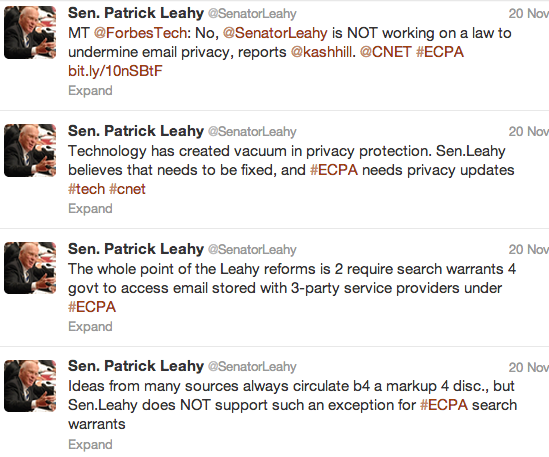
- Target Will Match Amazon Prices on the Spot!Here is How to Get that Amazon Price at Target - 8/8/2018
- Washington Post Columnist Suzi Parker Erroneously Reports Satirical Story About Sarah Palin Taking Host Position with Al Jazeera - 12/10/2016
- Android People App on Google 4.2 Operating System Jelly Bean Omits Entire Month of December from Calendar - 12/10/2016
Update: We have just learned that Senator Leahy has withdrawn his support for the amendments to the Electronic Communications Privacy Act (ECPA). He received resounding criticism from many groups and private citizens who felt that the revisions are unconstitutional and a gross invasion of privacy. In a series of tweets, below, Senator Leahy said that he did not support the bill amendments, and seems to deny that he ever did.
The Democratic chairman of the Senate Judiciary committee, Patrick Leahy, has stealthily rewritten a Senate proposal, the Electronics Communications Privacy Act (ECPA), being lauded as one that will protect email privacy, to allow the government to access citizen emails, Facebook wall posts, direct messages on Twitter, and even Google Docs files without a search warrant, just a subpeona. Privacy groups are outraged that a warrant is not required and that a simple subpena will allow law enforcement to search Internet accounts.
[Note: As we have already noted previously data stored in the cloud already does not require a warrant to be accessed by law enforcement]
More than 20 agencies would be allowed this access if the bill, set to be voted upon next week, is actually passed. Those agencies include the Federal Trade Commission, the Federal Maritime Commission, the National Labor Relations Board, and the Federal Reserve. In fact, the bill is now worded as such that Homeland Security and the FBI would be able to gain total access to your Internet accounts without even having to notify you first, and without having to obtain a warrant from a judge.
A rundown of some of the bill’s heinous aspects:
The Internet Patrol is completely free, and reader-supported. Your tips via CashApp, Venmo, or Paypal are appreciated! Receipts will come from ISIPP.
- Only a subpoena, rather than a signed search warrant, would be required to access personal Internet accounts.
- State and even local law enforcement would be able to access all types of communication that are stored on non-public systems.
- As long as law enforcement says that the situation is an emergency, they could not only access personal accounts without a warrant, but it would also not be subject to a later review by the court.
- If a customer is notified that their accounts were accessed by a governing agency, that notification can be postponed for up to 360 days.
The bill initially required reasonable due process to access private Internet accounts, but Leahy caved after receiving push back from several law enforcement agencies. The roundup of supporters of this revised bill includes:
- National Sheriffs’ Association
- National District Attorneys’ Association
- Justice Department
Those against the new wording of the bill includes:
- American Civil Liberties Union
- Electronic Privacy Information Center
There is no doubt that that the approval of this bill could have a detrimental impact on cloud-based services if more citizens, worried about their own privacy, opt to store items on external drives. Not long ago, several Internet and communication giants including Amazon.com, AT&T, Twitter, Intel, Facebook, Google, Microsoft, Apple and eBay, formed the Digital Due Process coalition (DDP), which aims to protect the privacy of Internet users. Citing the Fourth Amendment, “The right of the people to be secure in their persons, houses, papers, and effects, against unreasonable searches and seizures, shall not be violated, and no Warrants shall issue, but upon probable cause…” the DDP is seeking to ensure the privacy of Internet users from the prying eyes of the law.
The cornerstone of their philosophy is the fact that technology is constantly changing and advancing, and that the laws surrounding this often-fluid technology need to ensure that users are protected, while still allowing law enforcement to do their job. No doubt that they have a financial stake in the outcome of this vote, as lessened privacy could mean the loss of users. And let’s face it, privacy has never been at the forefront of Facebook’s concerns until faced with a possible setback, such as this bill.
But citing the Fourth Amendment as the basis for their argument is precisely wherein much of the controversy lays. The Fourth Amendment was obviously written well before these types of technology and communication vehicles existed, and courts are now having to figure how it applies to the communication landscape as it stands today.
If this bill is enacted, the likelihood of it going to court is high as the DDP and other privacy groups prepare to defend an issue that could negatively impact financial performance for Internet companies, and cross a new line in citizen monitoring that will likely leave many wondering where the privacy invasion will end. And with the financial backing of all of the heavy-hitters in the DDP portfolio, that kind of court battle could bring a whole new meaning to a “Clash of the Titans.”
Update: We have just learned that Senator Leahy has withdrawn his support for the amendments to the Electronic Communications Privacy Act (ECPA). He received resounding criticism from many groups and private citizens who felt that the revisions are unconstitutional and a gross invasion of privacy. In a series of tweets, below, Senator Leahy said that he did not support the bill amendments, and seems to deny that he ever did.
The Internet Patrol is completely free, and reader-supported. Your tips via CashApp, Venmo, or Paypal are appreciated! Receipts will come from ISIPP.










